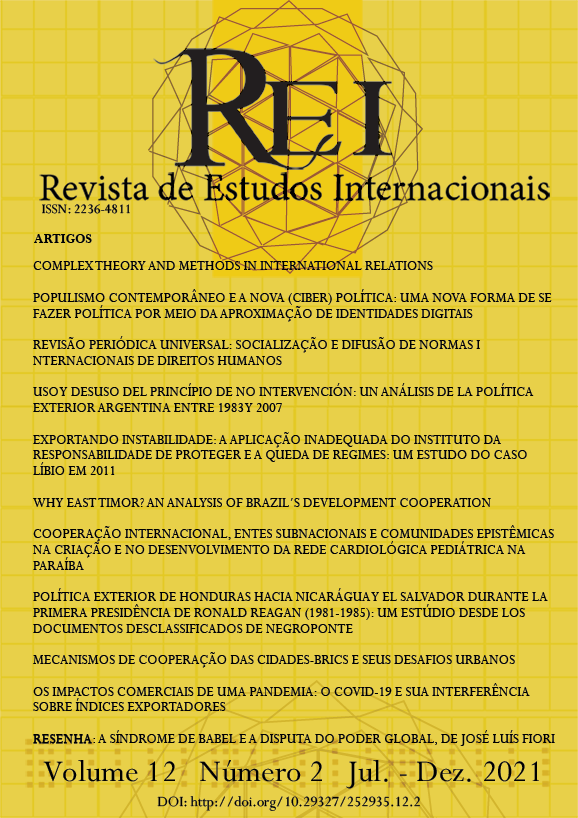REVISÃO PERIÓDICA UNIVERSAL: SOCIALIZAÇÃO E DIFUSÃO DE NORMAS INTERNACIONAIS DE DIREITOS HUMANOS
DOI:
https://doi.org/10.29327/252935.12.2-3Resumo
A Revisão Periódica Universal (RPU) do Conselho de Direitos Humanos das Nações Unidas (Conselho) consiste em um mecanismo de fiscalização periódica da situação dos direitos humanos nos Estados membros da Organização das Nações Unidas (ONU). Criada no contexto de extinção da Comissão de Direitos Humanos (Comissão), a RPU representa uma tentativa de superar a seletividade no monitoramento dos direitos humanos. O objetivo deste artigo é analisar a RPU como um espaço de difusão de normas internacionais e socialização que gera possibilidades para a internalização de padrões desejáveis de comportamento em direitos humanos pelos Estados. Para atingir este objetivo, utilizamos revisão bibliográfica da literatura especializada e análise documental primária. Verificamos que a RPU possui características que possibilitam analisá-la sob a perspectiva da socialização e propusemos uma discussão sobre a possível internalização de normas e compliance como resultado do shaming ocorrido na Revisão. Esse exercício teórico possibilitou destacar as características da RPU que assemelham o mecanismo com espaços de difusão de normas e socialização descritos na literatura.
Referências
ALSTON, Philip. (2006) Reconceiving the UN human rights regime: challenges confronting the new UN Human Rights Council. Melbourne Journal of International Law, 7 (1): 185-224.
BARRY, Colin M., CLAY, K. Chad; FLYNN, Michael E. (2013) Avoiding the Spotlight: human rights shaming and foreign direct investment. International Studies Quarterly, 57: 532-544.
CARRARO, Valentina; JONGEN, Hortense. (2018) Leaving the doors open or keeping them closed? The impact of transparency on the authority of peer reviews in international organizations. Global Governance, 24 (4): 615-635.
CARRARO, Valentina; CONZELMANN, Thomas; JONGEN, Hortense. (2019) Fears of peers? Explaining peer and public shaming in global governance. Cooperation and Conflict, 54 (3): 335-355.
CHECKEL, Jeffrey T. (2005) International institutions and socialization in Europe: introduction and framework. International Organization, 59 (4): 801-826.
EHRENBECK, Mirelle. (2006) The United Nations Human Rights Council: establishment and first steps - notes and comments. South African Yearbook of International Law, 31 (1): 209-223.
FINNEMORE, Martha; SIKKINK, Kathryn (1998) International norm dynamics and political change. International Organization, 52 (4): 887-917.
______. (2001) Taking stock: the constructivist research program in international relations and comparative politics. Annual Review of Political Science, 4 (1): 391-416.
GOODMAN, Ryan; JINKS, Derek (2004) How to Influence States: socialization and international human rights law. Duke Law Journal, 54 (3): 621-703.
HAFNER-BURTON, Emilie M. (2013) Making Human Rights a Reality. Princeton: Princeton University Press.
HAFNER-BURTON, Emilie M.; TSUITSUI, Kiyoteru. (2005) Human rights in a globalizing world: the paradox of empty promises. American Journal of Sociology, 110 (5): 1373-1411.
HERNANDEZ, Matheus C.; ROSA, William T. L. (2018) Os EUA e a Revisão Periódica Universal do Conselho de Direitos Humanos da ONU. Estudos Internacionais: revista de relações internacionais da PUC Minas, 6 (1): 127-149.
JOHNSTON, Alastair. (2001) Treating international institutions as social environments. International Studies Quarterly, 45 (4): 487-515.
KATZENSTEIN, Peter J., Ed. (1996) The culture of national security: norms and identity in world politics. New York: Columbia University Press.
KECK, Margaret E.; SIKKINK, Kathryn. (1999) Transnational advocacy networks in international and regional politics. International Social Science Journal, 51 (159): 89-101.
KEOHANE, Robert; MARTIN, Lisa. (1995) The promise of institutionalist theory. International Security, 20 (1): 39-51.
LEBOVIC, James H.; VOETEN, Erik. (2009) The Cost of Shame: International Organizations and Foreign Aid in the Punishing of Human Rights Violators. Journal of Peace Research, 46 (1): 79-97.
RISSE-KAPPEN, Thomas; ROPP, Stephen C.; SIKKINK, Kathryn. (1999) The power of human rights: international norms and domestic change. Vol. 66. Cambridge: Cambridge University Press.
RON, James; RAMOS, Howard; RODGERS, Kathleen. (2005) Transnational information politics: NGO human rights reporting, 1986-2000. International Studies Quarterly, 49 (3): 557-587.
SIMMONS, Beth. (2009) Mobilizing for Human Rights: International Law in Domestic Politics. Cambridge: Cambridge Universisty Press.
SQUATRITO, Theresa; LUNDGREN, Magnus; SOMMERER, Thomas. (2019) Shaming by international organizations: Mapping condemnatory speech acts across 27 international organizations, 1980–2015. Cooperation and Conflict, 54 (3): 356-377.
TERMAN, Rochelle; VOETEN, Erik. (2018) The relational politics of shame: evidence from the universal periodic review. The Review of International Organizations, 13 (1): 1-23.
UNITED NATIONS [UN]. GENERAL ASSEMBLY. HUMAN RIGHTS COUNCIL. (2007). Institution-building of the United Nations Human Rights Council. A/HRC/5/1.
UPR INFO. (2014). UPR Info’s Database: Action category. Out. Publicado em: [https://www.uprinfo.org/database/files/Database_Action_Category.pdf]. Disponibilidade: 24/06/2019.
UPR INFO. (2021). UPR Info’s Database of recommendations. Publicado em: [https://upr-info-database.uwazi.io/] Disponibilidade: 24/06/2019.
UPR INFO. (2016). Thailand: CSOs lobby with government to accept pending recommendations. 28 set.. Publicado em: [https://www.upr-info.org/en/news/thailand-csos-lobby-with-government-to-accept-pending-recommendations]. Disponibilidade: 24/06/2019.
WALTZ, Kenneth N. (1979) Theory of International Politics. New York: McGraw-Hill.


